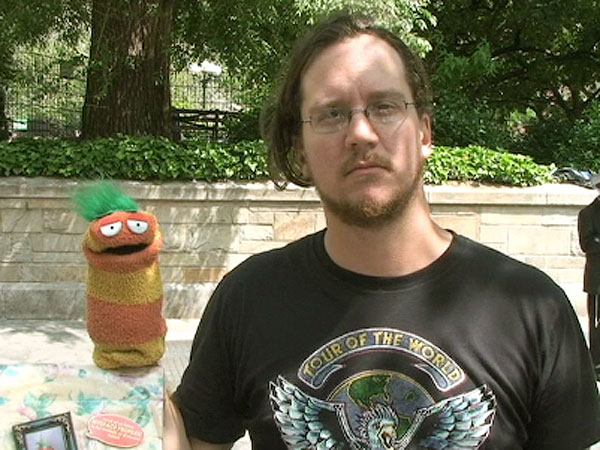
Photo by: Shane Dixon Kavanaugh
Artist Marty Allen opposes the curtailing of art vending in city parks.
Marty Allen believes New York City has a lot of problems. But he says the hundreds of street artists who have sold their paintings, poems, photographs and hand-crafted ephemera in Union Square are not one of them.
“Union Square Park has never been this bucolic paradise,” says Allen, who has made a living the last four years selling sock puppet portraits there. “It’s always been a hub of activity.”
The city, however, believes that the artistic activity in Union Square and other Manhattan parks has clogged pedestrian walkways, created public safety hazards and turned the large swaths of the public’s green space into year-round flea markets.
In April the Parks Department introduced a proposal that would limit the number of artists who sell their work in Union Square Park, Central Park, Battery Park and the Highline Park by more than 75 percent. The rules would create a limited number of first-come-first serve spots for artists to set up shop in each park. They’d also regulate the dimensions of a seller’s table or easel, as well as its proximity to statues, trashcans and other pieces of public property.
Despite outcries at public hearings and large, organized protests, the new rules went into effect July 19. The battle wages on in the State Supreme Court, where Wednesday, a justice temporarily restrained the city from enforcing the law until Monday, according to The New York Times.
Opponents of the proposal included artists, the New York Civil Liberties Union, some community groups and Melissa Mark-Viverito, who chairs the New York City Council’s parks committee. They believe the proposal is an assault on First Amendment. It will endanger the livelihood of many artists and starve the parks of their creative and chaotic energy.
Many have also suggested the proposal is a move by the Parks Department to make way for more corporate vendors and commercial interests to make money in these parks. They point to Shake Shack, Union Square’s Holiday Market and even Calvin Klein’s $3 million private party on the Highline in 2008.
“I think that the argument that Parks is raising is really just smoke and mirrors,” said Mark-Viverito in a recent interview. “I think they’re really just trying to clear up the areas in order to justify other opportunities that exist. Opportunities they can control and generate income from.”
Right now the city allows more than 500 concessionaires to operate in parks throughout the city. They range from hot dog vendors to riding stables to restaurants. Last year alone concessions generated more than $43 million in revenue for the city, according to recent testimony from the Parks
Department.
Parks Commissioner Adrian Benepe has rejected the notion that the Parks Department wants to pave the way for more commercial interests by kicking artists out of parks.
“The whole idea that we’re limiting the number of expressive matter vendors so that we can replace them with other vendors is simply not true, and is part of a campaign of disinformation being raised by the vendors,” he told The New York Times in April.
Benepe and other proponents of the proposal maintain that it’s a reasonable response to the congestion created by street artists. The Central Park Conservancy, New Yorkers for Parks, a number of Business Improvement Districts and area residents all threw their weight behind the proposal.
While a federal judge has blocked an injunction against the new park rules, history and legal precedent are not on the side of the Parks Department. In 1996 a Federal Appeals Court
granted full First Amendment protection to street artists in New York City, following attempts by the Giuliani Administration to have them arrested on the spot.
When the Parks Department tried to impose a parks permit for artists in 1998, the same Federal Appeals Court found that the Parks Department had violated the U.S. Constitution.
Finally, in 2003, the City Council rejected a bill introduced by the Bloomberg Administration that attempted to circumvent the Federal Court’s previous two rulings.







